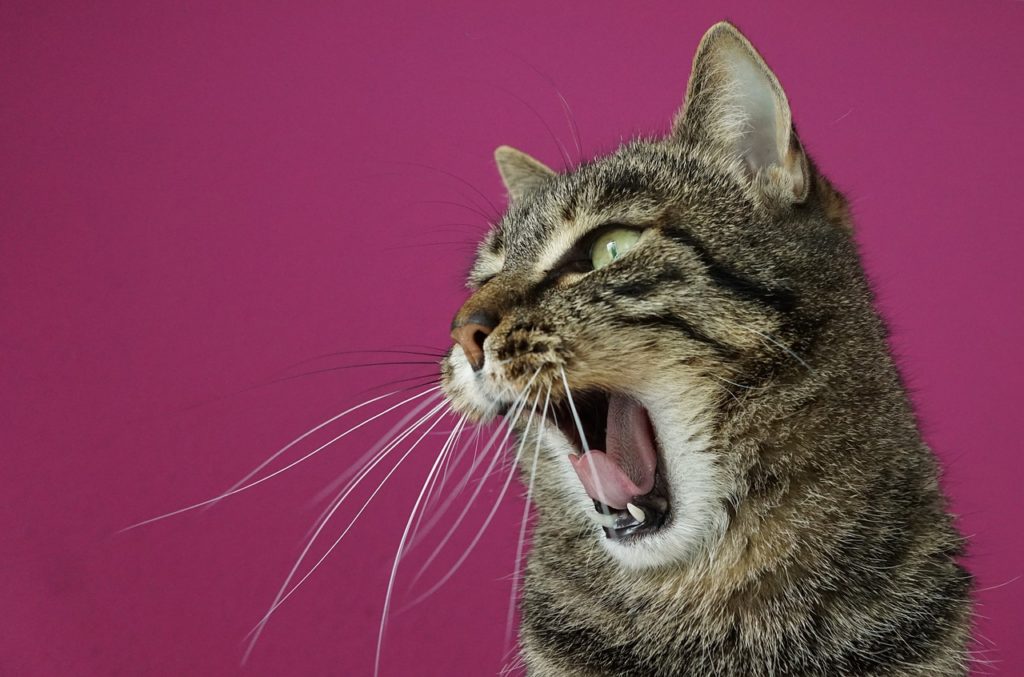Coughing Cat: What causes a cat to cough?
A coughing cat is caused by the irritation of the windpipe and other parts of the respiratory system. Coughing in cats is usually caused by the irritation of the trachea or bronchi, which is caused by the respiratory system attempting to remove a foreign substance or inflammation mucus that is blocking the airways. Below are the different causes of coughing in cats.
Causes of Coughing Cat
Inflammation of the Respiratory Tract: The most common form of Respiratory inflammation in cats is Bronchitis. This is usually a result of an affection bacteria or some other substance clogging the airways and creating excess mucus that irritates that cats airways and causes breathing problems and coughing.
Cat Asthma: Feline asthma is another frequent cause of cat coughing. Around 1 percent of cats worldwide develop feline asthma. Unfortunately, there is no cure for feline asthma, but it can be controlled by anti-inflammatory medication prescribed by your veterinarian. Symptoms of Cat asthma include coughing, wheezing, and trouble breathing. Outdoor cats are more prone to developing cat asthma than indoor cats. Common causes of cat asthma include pollen, mold, dust, smoke, obesity, and even stress.
Parasites and worms: Worms can penetrate your cat’s respiratory system and cause irritation and trouble breathing. Heartworms are the most common form of parasites that penetrate a cat’s respiratory system.
Tumors: Tumors in cats are not common, but the presence of tumors in or around the respiratory system can cause coughing.
Fungal infection: Although it is rare, your cat could develop a fungal infection in their lungs. This is usually caused by ingesting grass and soil and causes chronic coughing.
Tight Collar: This is one of the most often over-looked causes of coughing. If your cat’s collar is too tight, it puts uncomfortable pressure on the windpipe and can lead to respiratory damage and coughing.
Cat Hairballs: Hairballs are another cause of cats coughing and sneezing. The hair is usually ingested when your cat is grooming yourself. You cats coughs in an attempt to remove the hair from the respiratory system.
How to Diagnose a coughing cat:
If your cat begins coughing, you don’t need to rush to the vet right away. Monitor your cat closely, and if the cough continues for more than 4 days, it is advisable to visit the veterinarian. You should visit your vet sooner if your cat is coughing up a substance, especially if it is blood. If your cat’s coughing comes and goes, but you notice that your cat is losing weight or hair, you should visit your vet.
Cat coughing treatment:
Once you take your cat to the vet, they will probably run a series of laboratory tests including swab and blood tests. Serious cases may require x-rays. For minor cat coughing cases, the doctor will prescribe decongestion medication. If there is an infection, the vet will likely prescribe a series of antibiotics. It is also common for vets to prescribe anti-inflammatory medicine for cats with asthma and allergies.
Natural remedies for cat coughing and cat asthma:
There are some home remedies that you can use to treat your cat’s cough. We recommend avoiding dry cat food. There are also many herbal supplements that help clear your cat’s throat and sooth the windpipe.
Cat Chronic Cough:
It is very important to treat a cough early. If your cat’s coughing prolongs for one or two months, it can cause permanent membrane damage on your cat’s lungs and throat. Additionally, most of the infections that cause cat coughing progressively get worse if they are not treated.

